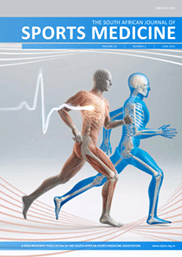Body composition and habitual and match-day dietary intake of the FNB Maties Varsity Cup rugby players
DOI:
https://doi.org/10.7196/SAJSM.504Keywords:
Body composition, Dietary intake, Rugby players, Sport nutritionAbstract
Background. Rugby is a physically demanding body contact sport. Optimising dietary intake and body composition can positively affect the performance of rugby athletes.
Objectives. To determine the body composition, habitual and game-specific nutritional practices of FNB Maties Varsity Cup (MVC) rugby players.
Methods. A descriptive, cross-sectional study with an analytical component was conducted. Of all the MVC rugby players (N=35), 18 completed the sections on body composition and match-day dietary intake, while 11 completed the habitual dietary intake section. Body composition data were collected by an International Society for the Advancement of Kinanthropometry-accredited biokineticist. Habitual dietary intake data (via a self-administered 7-day food record) and match-day dietary strategies (via telephonic 24-hour recall interview) were collected and compared with nutritional requirements reported by the International Olympic Committee, the American Dietetic Association, the American College of Sports Medicine and the International Society of Sport Nutrition.
Results. Forwards had significantly higher weight (p=0.01), sum of seven skinfolds (p=0.01), percentage body fat (p=0.02), fat mass (p=0.01) and fat-free mass (p=0.01) than backs. Compared with current recommendations, group habitual dietary intake (mean (standard deviation)) was inadequate for total energy (45.4 (9.0) kcal/kg body weight (BW)), carbohydrate (4.3 (0.4) g/kg BW), polyunsaturated fatty acids (6.2 (1.7)% of total energy (TE)), calcium:protein ratio (6.5:1 (3.5:1)) and copper (2.3 (0.4) mg), while displaying higher-than-recommended intakes for total protein (2.4 (0.7) g/kg BW), fibre (37.7 (7.3) g/day), total fat (33.8 (4.3)% TE), saturated fatty acids (11.2 (13.1)% TE), cholesterol (766.3 (371.8) mg) and niacin (45.2 (6.9) µg). Habitual supplement use was high at 91% (n=10/11). Nutritional match-day strategies were excessive for protein (1.2 (0.6) g/kg BW) and fat (0.9 (0.4) g/kg BW) in the pre-event meal, inadequate for energy and carbohydrate during the game and excessive for alcohol (54.4 (59.9) g) after the game.
Conclusion. Forwards and backs differed significantly in various body composition measurements. In relation to observed practices, habitual dietary intake and nutritional match-day strategies were suboptimal, with high reported supplement use. Players in this sport potentially could benefit from specialist input to optimise dietary strategies and body composition in order to enhance performance.
Downloads
Downloads
Published
How to Cite
Issue
Section
License
Copyright (c) 2014 South African Journal of Sports Medicine

This work is licensed under a Creative Commons Attribution 4.0 International License.
The South African Journal of Sports Medicine reserves copyright of the material published. The work is licensed under a Creative Commons Attribution 4.0 (CC BY 4.0) International License. Material submitted for publication in the South African Journal of Sports Medicine is accepted provided it has not been published elsewhere. The South African Journal of Sports Medicine does not hold itself responsible for statements made by the authors.




.png)